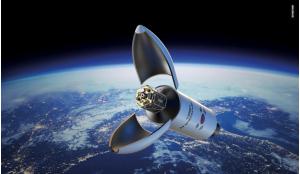Britain selects international teams to study possible spaceport.
The feasibility study contracts are
valued at a total of 1.5 million British pounds ($2 million), and
have been awarded to the following companies:
Airbus Safran Launchers, prime contractor for Ariane 5 and Ariane 6 rockets; Deimos Space UK, associated with Firefly Space Systems (USA); Lockheed Martin (USA); Orbital ATK (UK); Virgin Galactic.
So far the British government' policy
regarding the spaceport has been limited to helping with the legal
and regulatory framework that would make a British commercial
spaceport possible, while not providing any subsidies for its
development. According to Bob Waters, head of industrial strategy at
the U.K. Space Agency, “What government is committed to do is taking forward a regulatory environment and a legal environment for
introducing these vehicles. We have made absolutely no calls
whatsoever about whether to invest money. It’s something we’ve
never done, so this is a new regulation for us. We want to find out,
from an operator’s perspective, what it would take to do this
efficiently and cost effectively. We were also asking about
technologies that would be needed and how U.K. companies could play a
role with the primes that emerge in this area.”
The studies are being overseen by the Center for Earth Observation Instrumentation and Space Technology (CEOIST), on behalf of the U.K. Space Agency and final results reports are expected to be submitted by November. The reports are expected to include possible business models, future small-satellite markets and infrastructure requirements for a spaceport.
Rocket Lab wins launch contract from
Planet.
Rocket Lab, the company currently developing the Electron small launch vehicle has announced that it won a three-launch contract from remote sensing satellite company Planet, formerly Planet Labs. As per this contract, three of Planet's Dove satellites will be launched on Electron vehicles. A Dove satellite is a three-unit cubesat and weighs about five kilograms. According to Mike Safyan, director of launch and regulatory affairs at Planet, the number of satellites in each launch is likely to be between 20 and 25.
The Electron vehicle has not yet seen
its first flight, but if all goes well, the first Planet launch using
Electron small launch vehicle can happen as early as the second
quarter of 2017.
Aside from Planet, Rocket Lab also has a
three-launch contract with Moon Express, a commercial lunar lander
developer, and has won a Venture Class Launch Services contract from
NASA last year.
Thales Alenia Space announces new
contract with Orbital ATK.
Thales Alenia Space, a joint venture
between Thales (67%) and Leonardo-Finmeccanica (33%), announced the
signing of a new contract with Orbital ATK, Inc.
Under terms of the agreement, Thales Alenia Space will supply nine additional Pressurized Cargo Modules (PCM) to Orbital ATK for upcoming cargo resupply missions to the International Space Station (ISS). The cargo module is designed to transport crew supplies and science experiments on Orbital ATK’s Cygnus spacecraft under NASA’s Commercial Resupply Services contract. Cygnus recently delivered 7,900 pounds of cargo and science experiments to astronauts aboard the station and successfully completed its fifth mission under the contract. Orbital ATK is scheduled to complete 10 CRS-1 missions to the International Space Station before transitioning to launch cargo logistics missions under the CRS-2 contract in 2019.
“We are truly proud of the renewed trust that Orbital ATK has put in us," said Walter Cugno, Vice President, Exploration and Science of Thales Alenia Space. “The signing of this latest contract represents the continued vote of confidence from a valued customer in our engineering and our facility that provides pressurized cargo modules to re-supply the International Space Station. We look forward to continuing this successful relationship for many years to come.”
Sierra Nevada Corp. completes first
milestone under NASA contract.
Sierra Nevada Corp. (SNC) has announced that the first milestone under its NASA Commercial Resupply Services (CRS-2) contract on cargo delivery to the ISS has been completed. NASA has approved its plan for the various stages of SNC's Dream Chaser vehicle development. The monetary value of plan completion has not been released.
SNC was one of three companies that won CRS-2 contracts – the other two were Orbital Sciences Corp. and SpaceX.
“The accelerated completion of the
first milestone under the CRS-2 contract award marks significant
progress for SNC and the Dream Chaser program,” Mark Sirangelo,
corporate vice president of SNC’s Space Systems division, said in a
statement announcing the milestone.











